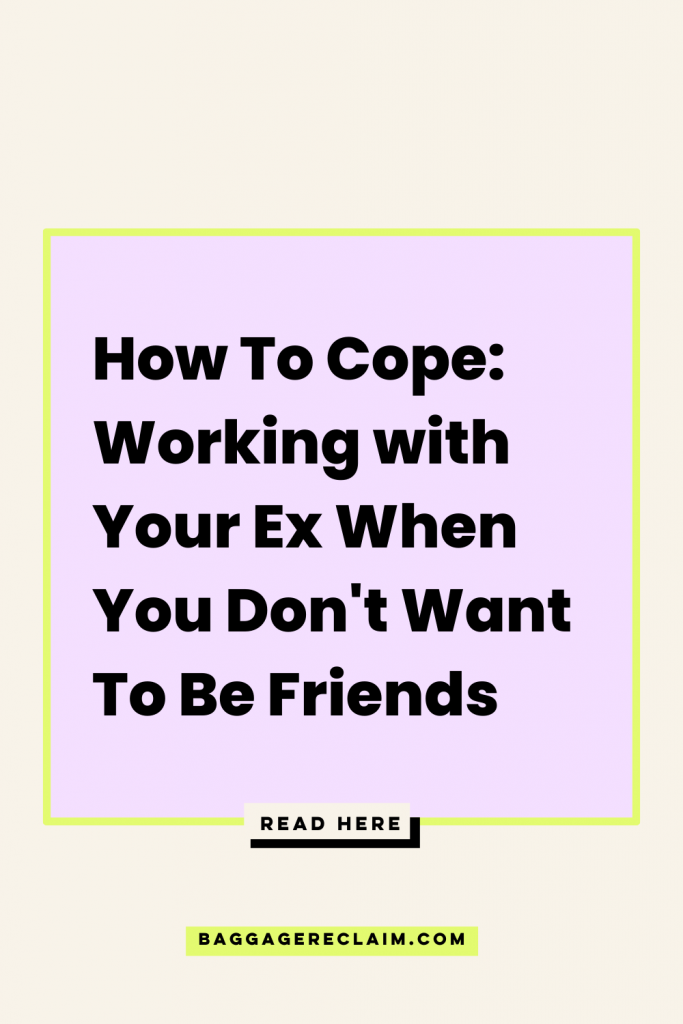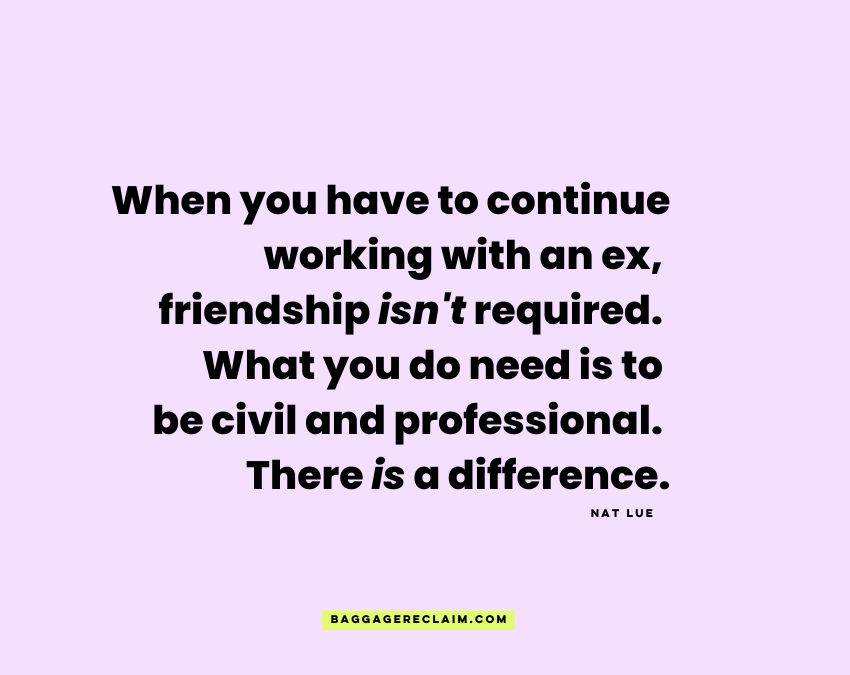Picture this: After dating your emotionally unavailable coworker, they’ve ended the relationship. I can’t give you what you want; it’s me, not you; I’m not ready for a relationship; I still have feelings for my ex; you knew my situation; I can’t be in a relationship with someone at work. You get the gist. Now you’re working with your ex.
Breakups are tough enough without having to see them every frickin’ day and maybe even have them sitting across from you. Then, to add insult to injury, there you are feeling wounded by everything that went down between you, and they’re not only acting as if everything’s normal, but they’re trying to be your friend.
Furious at their positive, happy attitude while you’re churning with blame, anger, resentment and feeling victimised, you’re finding it harder and harder to work together. Based on how you’re feeling right now, it’s hard to imagine that you will get over this breakup, never mind being able to work with and be friends with this person. Help is at hand, though.
If you’re working with your ex and you don’t want (or aren’t ready) to be friends, you have all my empathy. When I broke up with a coworker, he sat on the same bank of desks in our open-plan office and sometimes we had to attend client meetings together. Outside of work, we were also in the same social group. Total. pain. in. the. arse. Some days, I seethed so much at his easy-breezy ways and his haranguing me to chat or hook up that I went home and screamed into a pillow.
So here’s the craic:
When you have to continue working with an ex, friendship isn’t required. What you do need is to be civil and professional. There is a difference.
Anything that facilitates the work requires civility because you’re operating within professional boundaries that respect you both as well as the workplace, including team members.
You don’t need to act like you’re bezzy mates with your ex to work together. Hell, you likely work with at least one person who gets on your tits and (hopefully) manage to put that aside! Put on your ‘work hat’, not your ‘I-want-you-back hat’ or ‘scorned lover hat’. No one, so not your ex, coworkers, boss, or even you, has the right to expect you to engage beyond being professional. This is especially so when it forcing you to be “friends” will harm your well-being. Let the awareness of being at work and the necessity for healthy work boundaries guide your behaviour. Yes, even if it’s through gritted teeth sometimes.
Outside of being civil and professional, you need to create boundaries from a place of deciding how you want to feel and the level to which you want to engage.
You are the feeler of your feelings. That’s not to say that your ex might not have had their share of assclown moments, but you are the feeler of your feelings. If you’re feeling rough in the aftermath of the breakup, take responsibility for anything you have said or done to contribute to these feelings. So, yes, your ex might not have behaved well during the relationship or handled the breakup badly. What you need to acknowledge is the story you’ve told yourself about their behaviour or the relationship not working.
Your ex is not responsible for how you feel right now.
You both participated in this situation of being romantically involved while working together. Each of you had your own motivations for doing so, some of which may or may not have been obvious to you at the time. In being involved despite the implications at work if your relationship didn’t succeed, you both took a risk that, yes, may have felt good in the short term but has made it pretty awkward now that you’re no longer together.
That doesn’t mean that your ex hasn’t done things. You will stop feeling so victimised, though, when you acknowledge those split-second decisions that resulted in you going ahead with your involvement despite, on some level, being aware that it wouldn’t be a good idea. Acknowledging your culpability in this involvement doesn’t make you responsible for their actions, including any mistreatment.
Work out what you need to stop or start doing that will support you in the aftermath of your breakup.
For example, for me, it was not forcing myself to go along to every social event and putting my feelings ahead of the social group. This meant that when I did go to something, I didn’t force myself to partake in a performance of friendship with my ex. I stopped giving myself a hard time for still feeling angry and not wanting to be friends. The guilt was eating me up. I wasn’t being ‘immature’ and ‘spiteful by being No Contact with my ex. I needed to distance myself so that I could have healthier boundaries that took care of me. Acknowledging this helped me recognise where he was also manipulating me.
If your coworker ended your romantic involvement in an uncaring manner or they didn’t treat you well, that’s about them, not you.
Your anger and hurt are understandable.
One of the traps we fall into, not just with workplace relationships but forging romantic relationships with friends is assuming that because we work together or are friends, the person will not hurt us.
Sometimes we take it to another level and assume that the person wouldn’t run the risk of creating a super awkward situation at work or risk damaging the friendship if they didn’t have deep feelings for us.
In reality, working together and/or being friends doesn’t necessarily temper someone’s typical romantic relationship behaviour. And some of these people will assume that we already know what they’re like, so won’t be surprised by their unavailable or shady behaviour.
Sometimes we feel angry with our ex because we weren’t the one to end it, even though we knew we needed to. We then feel like our ex is the winner (nope!) and that we’re the loser (also nope). Even if we initiate the breakup, our ex appearing happy can also trigger anger and a sense of having ‘lost‘.
You have a choice here: You can accept that whoever got in there first and finished the relationship, it’s finished. Whether you ended it or they did, dating someone at work would be an awkward situation all around.
Sure, you might have taken comfort in the fact that you ended the relationship, but odds are that you would be behaving like they are now— trying to smooth things over so as not to create an awkward situation. If the shoe were on the other foot and you’d mistreated them, you might push for friendship to make yourself feel better about your behaviour.
If you’re going to continue working with your ex, communicate (and follow through with) your boundaries.
You can be very upfront with your ex, as I was with mine, and make your position clear. Let your ex know that you are aware of what they’re doing by trying to be “friends” and that they need to stop. You are okay with engaging with them for purely professional reasons, but outside of that, they’re to leave you alone.
Tell your ex that they can’t {whatever they did} and then expect you to go back to being friends (especially if you weren’t in the first place). Let them know that if they send anything that isn’t professional, you will ignore it. Side note: When my ex wouldn’t get a reply to personal messages, he’d tagged them on to work-related emails. I just replied to the work-related bit and ignored the rest.
I get that your ex wants to be friends for whatever reason, but it’s okay that you’re not ready. Or that you don’t ever see yourself being friends.
Your ex doesn’t have a right to your friendship. And actually, if your ex keeps pushing for friendship and ignoring the very real effects of their behaviour or the breakup, and then you ignore yourself too, it reinforces the anger, hurt, resentment, etc. The more you go against yourself, the worse you will feel and the longer it will take to grieve the loss of the relationship.
Don’t apologise for how you feel.
Your ex is no fool. If the shoe were on the other foot, unless they were trying to audition for another go-round of the relationship, they wouldn’t rush to be your friend.

Accept that in terms of what happened with your ex and how that’s affected you, you are both responsible for that situation.
Blame, though, is about finding fault, and responsibility is about taking care of your side of the street and learning what you need to.
Again, it isn’t about trying to whitewash your ex’s behaviour; it’s recognising that you don’t have to victimise yourself.
When we, for example, tell ourselves that we’ve been taken advantage of in a situation that, until it wasn’t going our way, we were willing to go along with it, we need to have an honest conversation with ourselves. We need to admit where we were willing to participate in the situation and allow ourselves to be taken advantage because of what we thought we would “get” from the person and the situation (or what we got to avoid about something or someone else).
Your ex might have a positive, happy attitude because they’re at work. They’ve possibly compartmentalised what has happened. If they were emotionally unavailable during your relationship, it’s not a great leap to acknowledge that they might shut down any uncomfortable feelings. Everyone has their way of dealing (or not dealing) with things.
It’s easy to assume that this level of self-honesty will only bring you pain. In reality, it’s liberating.
You stop feeling stuck and victimised because you allow yourself to process what’s happened and gain perspective. Also, if you’re deliberating about staying at or leaving your job, it’s best to make that decision from a more honest place so that you don’t drag the pain into the new job or make the decision based on ego.
Working with your ex isn’t for everyone, and you will need to weigh up if you’re getting enough from this job to outweigh your discomfort. It’s easy to fall into the trap of digging your heels in. Why should I have to leave?, you might wonder. You’re better off asking, What price am I willing to pay with my well-being just to make a point?
Make sure, if you stay in your job, that it’s because you love it or absolutely have to, not because you’re hanging around on the off-chance that your ex will change their mind or hoping to make them feel guilty with your presence. Know your ‘why’.
Ultimately, you don’t know what’s going on in your ex’s head. Spend some time being honest with yourself about what you feel guilty, angry and blaming about — and then focus on getting to the truth. We only stay in these feelings when we’re living off untruths. Hence if you want the feelings to move on and the situation to improve, get truthful.
The Joy of Saying No: A Simple Plan to Stop People Pleasing, Reclaim Boundaries, and Say Yes to the Life You Want (Harper Horizon/HarperCollins) is out now and available in bookshops on and offline. Listen to the first chapter.


 Add to favorites
Add to favorites 
